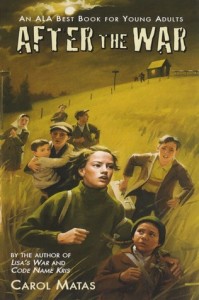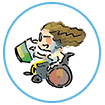 Summary: When World War II ends, Ruth is left to pick up the pieces of her shattered life. As a Jew who survived the Holocaust, Ruth searches for her lost family members among a sea of displaced persons trying to find each other and a new purpose. Israel is the promised land in more ways than one, and Ruth’s motivation to join those on this exodus from Poland comes from being enlisted to the cause as opposed to religious fervour. Along the way, Ruth slowly faces the horrors she has experienced, watching the reactions of others while dealing with her own, searching like everyone else for a place without hatred, where she can finally be safe.
Summary: When World War II ends, Ruth is left to pick up the pieces of her shattered life. As a Jew who survived the Holocaust, Ruth searches for her lost family members among a sea of displaced persons trying to find each other and a new purpose. Israel is the promised land in more ways than one, and Ruth’s motivation to join those on this exodus from Poland comes from being enlisted to the cause as opposed to religious fervour. Along the way, Ruth slowly faces the horrors she has experienced, watching the reactions of others while dealing with her own, searching like everyone else for a place without hatred, where she can finally be safe.
Number of Pages: 138
Age Range: 12-14
Review: In an eye-opening book about life for Jewish people after World War II, Carol Matas explores the roles of sorrow, loss and a thirst for justice in surviving unspeakable times.
What touched me most was a conversation Matas features between Ruth and her friends about God. After all of the terrible injustices they’ve endured, they each have a different perspective on whether he even exists and if he does, why he would allow such things to happen. It’s a profound note to a short but poignant story.
Knowing the history beyond Ruth’s time period was bittersweet because Matas sets up Israel to be everything the Jews are looking for when in fact they are plunged into further hardship and turmoil. The story itself was a learning experience for me, and reading about Ruth’s journey was enjoyable because she was an astute observer. Watching Simon and others react to their experiences by becoming militant and jaded was heart-rending but completely understandable, and I thought Matas did an excellent job of highlighting the resulting actions of various people in the face of loosing everything.
There are so many stories to tell about WWII, and once again I have seen things from another perspective. My interest continues to be piqued with fresh views like Matas’.
Memorable Quotes:
“‘You deserve everything good in the world,’ he murmurs.
I smile.
His eyes open wide. ‘You smiled! I’ve never seen you smile. What did I say!’
‘You’re so funny,’ I whisper. ‘There is no good in the world. You just have no idea!’
He grows angry then. It’s the first time I’ve seen him mad. ‘Don’t tell me I have no idea,’ he says. ‘Don’t tell me that.’
I could kick myself. I don’t know what happened to him and his family but it’s bound to be horrible.
‘I’m sorry,’ I apologize, and I really mean it. ‘Please forgive me.’
He nods but still looks shaken.
‘It’s all right,’ he says. Then he pauses. ‘My pain is no less than yours, Ruth.’
I touch his hand, which is clenched on the bed. ‘I know. I know that.'” – Conversation between Zvi and Ruth from After the War by Carol Matas, pages 66-67
“‘The world understands one thing and one thing only, force. Who’s strong? Who’s weak? If the world sees we are weak, we’ll never get our land. If they see we’re strong, they’ll have to give it to us.'” – Simon from After the War by Carol Matas, page 112
“I spent the rest of the day lying in the tent. People come in and out, sometimes the children jump on my cot and beg for a story but I am wandering inside, wandering through my past, trying to see if there is a place there strong enough to hold me.” – Ruth from After the War by Carol Matas, pages 126-127
After the War by Carol Matas is published by Scholastic Canada, (1996).




 Amy Mathers has been passionate about reading from a very young age, and hopes others will share her enthusiasm for funding a teen book award.
Amy Mathers has been passionate about reading from a very young age, and hopes others will share her enthusiasm for funding a teen book award. 





